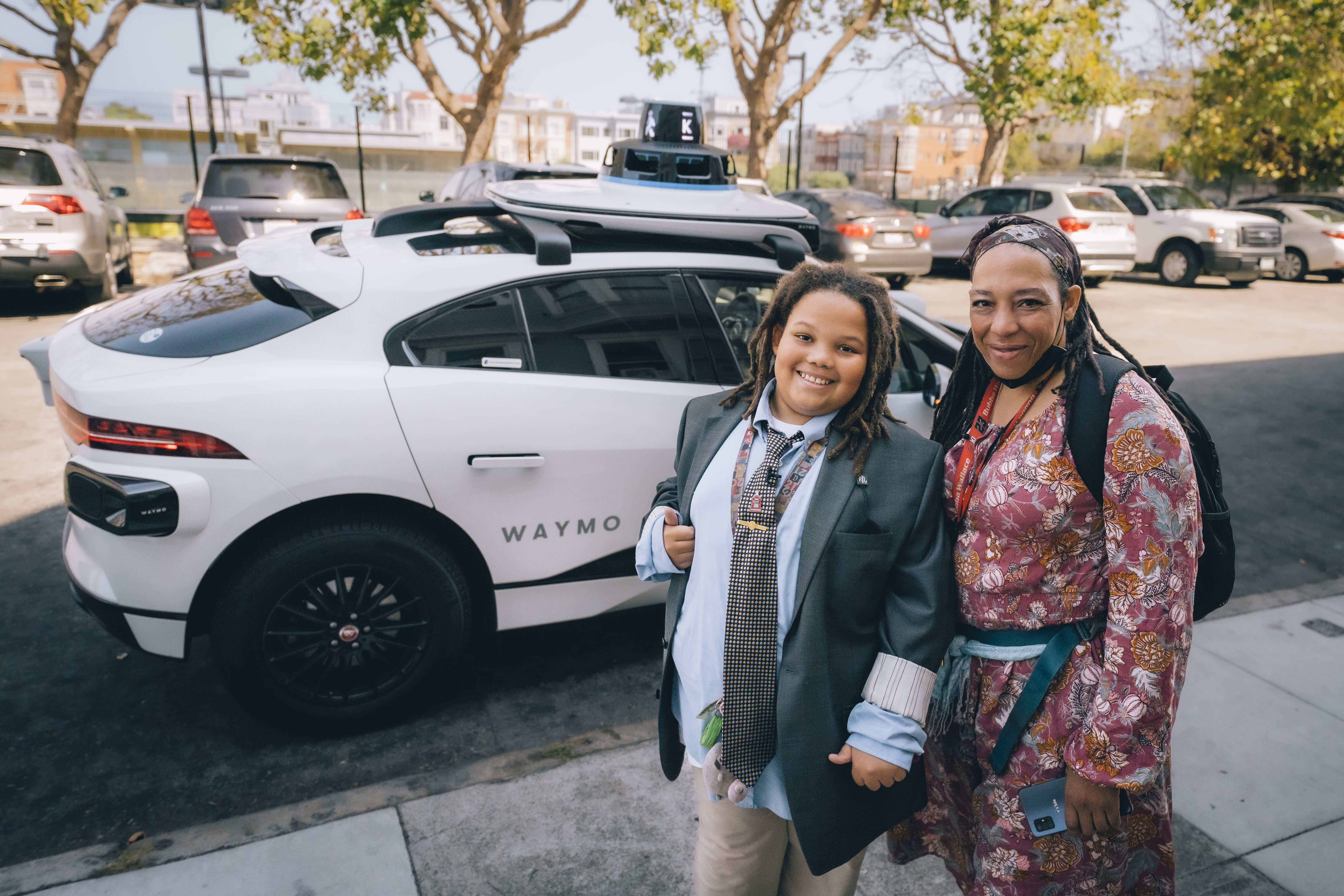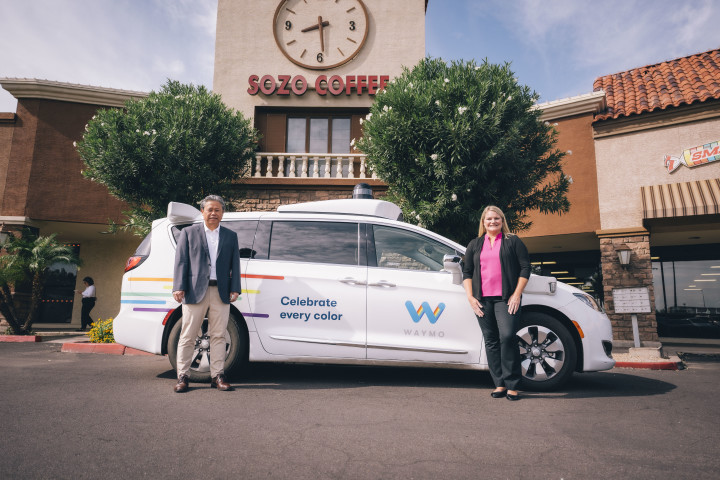A Mother of a Child with Autism Shares How Fully Autonomous Driving Could Benefit Families of Children with Disabilities
Play VideoRead
Support for Families of Children with Disabilities
King is a 10-year-old child who lives in San Francisco and loves to play computer games, kayak, and snowboard.
“I'm proud I got through these 10 years,” King says, endearingly. “I’m proud of school, I’m proud I learned snowboarding; I’m pretty much proud of everything we’ve done.”
King is curious, compassionate, and open, easily making new friends and jumping into new experiences.
King is also an Autistic child.
U.S. Centers for Disease Control (CDC) data on autism prevalence has shown that, by the age of eight, 1 in 44 children in the United have been diagnosed with Autism Spectrum Disorder (ASD) and, of those, a third also have an intellectual disability.

Did You Know?
By the age of eight, 1 in 44 children in the U.S. have been diagnosed with Autism Spectrum Disorder - CDC, 2018
King’s mother, Jessica, sees his Autism as a gift.
“I think everybody should look at any disability and try to find a gift in it because it's something special,” says Jessica, an advocate for children with disabilities.
Jessica marvels at her son’s love of music, his ability to find a song in anything, and his boundless compassion for other people and the environment.
When the COVID-19 pandemic began, Jessica and King had just moved to San Francisco. The newness of everything, the isolation, and the lack of new and structured activities where King thrives, weighed on the family. Jessica began to urgently search for support.
Jessica reached out to Support for Families of Children with Disabilities, a San Francisco-based nonprofit providing parents and caregivers with the information, education, and community support for their children to flourish and thrive.
After having a positive experience with the organization and, motivated by a desire to help other parents, Jessica took on the volunteer role of Community Connector at Support for Families with the mission of helping the organization reach communities of color.
As an advocate for families, Jessica is focused on breaking down barriers and allowing families of all backgrounds and income levels access to services and support. One of those perennial barriers is transportation.
“Transportation is a big disparity for many of our communities, especially the Black and Brown community,” Jessica says.
Transportation is a big disparity for many of our communities, especially the Black and Brown community.
In addition to the everyday stress of travel, Jessica said she also worries about her son’s safety as a Black child in the world: a world where Black people face the risk of discriminatory profiling just trying to get from point A to point B.
“As a Black family, it's very hard to keep a Black child safe, and it's even harder to keep a special needs, large, Black child safe,” She explained. “There are certain things that really hinder our lives on a daily basis besides just getting in the car.”
With every single trip, Jessica says she has to carefully weigh a constantly changing list of pros and myriad cons – the hassle, the anxiety, losing their parking space – before she gets in her car with King.
“It’s a struggle for us every day,” Jessica says. “I know we’ve had to cancel some appointments in the past because we just couldn’t make it that day.”
“There are so many challenges and barriers of transportation that families of children with disabilities face that I'm not even sure where to start,” says Wendy Neikirk Rhodes, Interim Executive Director at Support for Families. “Everything from physical accessibility and health care concerns, stress, to the rigidity of schedules, and the many motor and neurodevelopmental milestones that you have to achieve to successfully drive.”
There are so many challenges and barriers of transportation that families of children with disabilities face... Everything from physical accessibility and health care concerns, stress, to the rigidity of schedules, and the many motor and neurodevelopmental milestones that you have to achieve to successfully drive.
To explore how new mobility options could one day help families with disabilities, Support for Families has partnered with Waymo, a fully autonomous driving technology company with a mission to make it safe and easy for people and things to get where they need to go.
Waymo has announced it is bringing its fully autonomous technology to the SF community. As it has done in Arizona, Waymo partnered with area nonprofits like Support for Families to explore social use cases for the technology with partners who can provide real-time, real-life input.
“Support for Families of Children with Disabilities partners with Waymo, because we have a shared commitment to ensuring that all children with disabilities or special health care needs can live as independently as possible,” says Rhodes.
Support for Families and Waymo invited Jessica and King to take a ride with Waymo so they could experience the technology for themselves and share their experience.
“We're about the future and King’s a techie, so we were always curious,“ Jessica says.
It was a bright sunny day in San Francisco when a Waymo vehicle pulled up to take Jessica and King for their ride. They got into the vehicle and settled into their seats, and had the car play some of their favorite music from the singer Tamela Mann.

In the vehicle, King was fascinated by the technology – which is designed to obey traffic laws, follow the speed limit, and drive respectfully and predictably – and by how passengers can track their trip progress on a map.
“That was a great Waymo ride,” King exclaims after the trip.
Jessica says that Waymo’s autonomous driving technology offered her son something extraordinary and incredibly valuable to every person with Autism: a sense of safety, predictability, and understanding of what’s coming next.
“It’s amazing because he knew what was ahead and he was confident that he was going to get where he was going to get,” Jessica explains. “I could see where it could be a life changer for families and parents and kiddos and providers.”
It’s amazing because he knew what was ahead and he was confident that he was going to get where he was going to get.
Rhodes says she is excited about how technologies like Waymo’s could offer families a safe, low-stress transportation option that could bring them greater independence or freedom of mobility.
“When I think about what that could mean for the families we serve, for the families of our staff, and for my own children, it’s really exciting,” Rhodes says.
Jessica says that, in addition to greater mobility, she dreams of a future where people with disabilities and their families have a space everywhere.
My hope is that people see the superpowers that live in between the lines of disabilities.
“My hope is that no matter whether we walk into a restaurant, a grocery store, a business office, or anywhere that we step foot, that our lives are honored just as much as anybody else’s,” Jessica says. “My hope is that people see the superpowers that live in between the lines of disabilities.”



